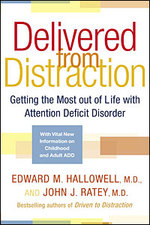I have no scientific proof of this, but I have long believed ADHD to be the American Disease.
Up to 5% of Americans are diagnosed with ADHD. I’m one of them. I’m creative, I’m quick, I tend to being a polymath. I also have trouble finishing anything longer than a blog post, I’m quick to anger, and I have enormous trouble concentrating on anything I’m told I have to concentrate on (as opposed to what I want to concentrate on). I am very difficult to compel.
In other words, I am both hyper-focused and distractable, I can be charming but I’m prone to depression. These are symptoms typical of what I call "male" ADHD, the kind you hear about and read about most often. I have likened it, most popularly, to having Robin Williams in my head. (This also brings a tendency to self-medicate. Robin’s had two stints in rehab.)
There is another kind of ADHD, which may be dramatically under-diagnosed. I learned about it from my daughter. I call it "female" ADHD. In this version you become Robin’s audience. You’re lost in your own world, and breaking out into the real world can be a struggle. This often comes with learning disabilities — dyslexia in my daughter’s case.
So why do I call this the American disease? Partly because very few Europeans have it. To many Europeans this proves Americans are making the whole thing up. But think about it. If you were living in, say Germany or Italy 100 years ago, or in Ireland or Scotland 200 years ago, or in England 300 years ago, and you had ADHD, what’s the first thing you’d think of doing?
Right, getting the heck out of there. Going to America.
So European-Americans are very likely to have ADHD — we’re
self-selected for it. And it wouldn’t surprise me to learn that
Californians are more prone to having ADHD than other Americans. My own
father had a lifelong love affair with California as the final
paradise, the place which would make everything right. Which no place
can do. (Here he is in 1986. I miss you, dad.)
Figure that, on average, 2% of the world’s population tends to have
ADHD. These are the shamans, the priests, the visionaries, the ones who
drive us "out there" yet often fail to get there themselves. It’s of
immense evolutionary benefit for an intelligent society to have some
members who are bent in that way — gets us out of our rut.
Europeans have self-selected in recent centuries against the ADHD
trait, so the rate among African-Americans should be somewhere between
2% and the European-American rate. (Depends on how many white folks
fall out of their family trees when you shake them.) Asian-Americans
may have rates similar to other Americans, maybe a little
lower for those whose choice to come here wasn’t entirely voluntary.
And the native American rate is about equal to that of the rest of the
world — again a little higher because of inter-marriage.
What can we do with such self-knowledge?
We can start by taking pride in it. The most powerful medicine I
ever got for my ADHD was the "owning" of it. That is, I admit I have
it, I know what the symptoms are, I know when those symptoms are
manifesting, and I know how to fight back or compensate.
Owning ADHD means ADHD no longer owns you. It’s the most powerful
part of the anti-addiction process, admitting it’s an organic condition
you’ll always have, seeking the good in it, being aware of and fighting
the bad.
There is immense good in ADHD. I hate it when it’s called a
Disability. A door is closed but the windows are wide open. In my case
I can sit here and write all of this in one draft, publishing this
whole essay in less than an hour. Not just because of blogging software
but because of ADHD.
In your case, whoever you are, you can do something similar. Maybe
not the same thing. But whatever you most care to do, you can do it
with enormous intensity. Time will seem to stand still when you’re
doing what you love, and you’ll look up suddenly and a half day will
have gone by. Then you’ll look down and something marvelous will have
come to be, or the beginnings of something marvelous. That’s what
hyper-focus and a creative impulse buys you.
And this is the miracle of America.
We are a nation of dreamers, of creators, of inventors. Not all of
us have ADHD, but enough do so that there’s a frisson you get from just
being in America. It’s what makes America so attractive, still, to
people outside it, even with the craziness of our leaders and the
amnesia of our voters.
But if ADHD is "the American disease," and ADHD has had so much to
do with what makes America so wonderful, so special, so unique in all
the history of the world, is ADHD really a disease at all? Is it really
a disability?
No, it’s not. And if you’ve reached this point in this essay, you
know that now, in your heart. It’s our inheritance. It’s what makes us
what we are. It’s why we so treasure freedom. The ADHD mind demands freedom, and will take it even when it’s not given. We call this the American way.
Attention Deficit Hyper-American Dreamer.












That’s an interesting idea. I’ve often thought that immigrants to the US were self-selected for religious obstinacy (otherwise they’d convert to whatever the official religion was in the face of majority oppression), and that this explains why Europe is now a haven for secular humanism compared to the US (ie. the ones left behind just didn’t *care* about religion per-se).
That’s an interesting idea. I’ve often thought that immigrants to the US were self-selected for religious obstinacy (otherwise they’d convert to whatever the official religion was in the face of majority oppression), and that this explains why Europe is now a haven for secular humanism compared to the US (ie. the ones left behind just didn’t *care* about religion per-se).
taking previous comment as granted, I have to stay in Europe and don’t go to America for anything apart short-term tourism, and thank New World for recycling bio-waste without any special effort.
taking previous comment as granted, I have to stay in Europe and don’t go to America for anything apart short-term tourism, and thank New World for recycling bio-waste without any special effort.
Intriguing theory, and I appreciate the positive view of ADHD (reminds me of Thom Hartmann’s). I think however there’s also another, darker side to the ADHD rates in different parts of the world: we’re the canaries in the coal mine when it comes to oppression.
For example, ADHD rates among African-Americans probably have less to do with the amount of European immigrant ancestry than the fact that slaves with ADHD were probably far more likely run away or revolt, and so less likely to survive the conditions of slavery and later Jim Crow.
ADHD rates in Europe probably were reduced by emigration, but also by the carnage of the Holocaust and the Iron Curtain. I would imagine that ADHD was more common among the Resistance and probably also among prisoners in the gulag, both similar to the slavery examples above.
Makes you wonder about the whole push esp. since the 1980s to medicate ADHD away doesn’t it…?
Intriguing theory, and I appreciate the positive view of ADHD (reminds me of Thom Hartmann’s). I think however there’s also another, darker side to the ADHD rates in different parts of the world: we’re the canaries in the coal mine when it comes to oppression.
For example, ADHD rates among African-Americans probably have less to do with the amount of European immigrant ancestry than the fact that slaves with ADHD were probably far more likely run away or revolt, and so less likely to survive the conditions of slavery and later Jim Crow.
ADHD rates in Europe probably were reduced by emigration, but also by the carnage of the Holocaust and the Iron Curtain. I would imagine that ADHD was more common among the Resistance and probably also among prisoners in the gulag, both similar to the slavery examples above.
Makes you wonder about the whole push esp. since the 1980s to medicate ADHD away doesn’t it…?